- Home
- Carl Deuker
Payback Time Page 4
Payback Time Read online
Page 4
But now was the right time. Kimi made it the right time. We'd be covering boys' football and girls' volleyball together, and other sports later in the year. What had Alyssa said—that I wasn't such a bad guy? I was almost certain Kimi didn't have a boyfriend, that she hung out in a group, not with one guy.
If I lost ten pounds a month, I'd be down to 170 by December. Maybe I'd even grow those couple of inches my dad has always promised me. Alyssa had been joking, but if I was five foot six and weighed 170, I might just ask Kimi to the Winter Ball. If I was five six and weighed 170, Kimi might just say yes.
I changed into a sweatshirt and sweatpants and drove to Green Lake. Mr. Johnson, my biology teacher, had said that fat people think they should lose weight and then start exercising. Johnson said that if a fat person got into shape, the weight would drop off naturally.
The last time I'd exercised was over a year ago when I'd signed up to play basketball at the community center. The league was supposed to be low-key, and I'm actually an okay basketball player. I can't rebound, but I can dribble with either hand and I can shoot lights out. Give me time to set my feet, and it's swish!
Most of the guys in the league didn't care about winning, but I was assigned to Larry Wolf's team, and Wolf hates to lose. "Give it your all," Wolf said to me before the first game. "We need you."
We played man-to-man defense, and I had to guard Craig Ruskin, a short kid with droopy eyes, a thick mop of hair, and sharp elbows. Ruskin scored six points early, but then seemed to stop trying. Late in the game I dropped in four long bombs of my own. We won 38–30 and Wolf was crazy with joy. "I didn't know you could shoot like that!" he said, slapping me on the back.
I felt pretty good about myself until we walked off the court and Ruskin sidled up next to me. "That's quite a secret weapon you've got," he said.
"What is?"
He nodded at my drenched shirt. "The way you sweat. All fat guys sweat, but you really sweat. Made me want to stay clear." He gave me a dumb smile. "No offense."
That ended by basketball career.
The path around Green Lake stretches nearly three miles. I've seen people running it for as long as I can remember: thin girls with long legs, hair pulled through the back of baseball caps, iPods strapped to their arms; muscular football players with powerful strides; lean soccer players with loping strides. But there were other people on the path besides athletes. Middle-aged men and women with paunchy stomachs. Dog-walkers, Rollerbladers, creaky old people, little kids on bikes.
I parked the Focus by the pitch-and-putt golf course and went to a post to stretch. Instantly I had the feeling that everyone was staring at me, thinking: What's that fat, weirdly white guy stretching for? But then an older man with gray hair stuck his leg on the post next to mine and nodded. I nodded back, feeling as if I belonged.
After a couple minutes, I started around the lake. I'd intended to walk, but seeing all the runners gave me the courage to jog. Everything went okay for a grand total of fifty yards. That's when I spotted Andrea Porter and Maddy Lee, both of whom were on the cross-country team. Maddy was tall and thin, with black hair and a long, silky stride. Andrea was a short blonde whose legs churned.
I panicked. If they saw me, they'd tell other kids, and then those other kids would tell other kids. You won't believe who was running Green Lake!
I turned off the path and headed down to the water where the men stand with their tackle boxes and their fishing poles. One grizzly-looking guy eyed me suspiciously. I tried to make conversation. "What do you catch?" I asked.
"Trout. You fish?"
"No."
"Hmm," he grunted, and turned away.
When I looked back to the path, Andrea and Maddy had passed; I could see their ponytails swinging in rhythm with their strides. I retraced my steps to the car and drove off.
14
THE MITCH-BEFORE-KIMI would have driven home, gone into the house, and headed straight to the refrigerator. But I was determined to get in shape. I was not going to be fat all my life.
Instead of going home, I drove to the Ballard Locks. I did one quick circuit around the garden—walking, not running—but when I finished I hadn't even broken a sweat.
I didn't want to go endlessly around and around the path, so I headed across the Locks and into the Magnolia neighborhood. Rachel Black and some other rich kids from Lincoln live in Magnolia, but they live on the fancy west side where the streets have names like Viewmont or Crestmont or Glenmont. I turned east into the industrial section, taking Commodore Way past the old warehouses and the junker homes.
I walked a block, then ran a block, walked, then ran. After ten minutes, my heart was thumping and my shirt was drenched in sweat. But so what? Craig Ruskin wasn't around. I ran/jogged all the way to Fishermen's Terminal, where I turned around. The return trip was uphill, so I was completely exhausted by the time I reached the Focus, but I felt good. This time I was going to stick with it.
I showered, ate an apple and a bagel—no cream cheese—and then went to work at my parents' business. They'd hired yet another new driver, so I had to give him directions to all the restaurants on our list. Still, he drove fast, so we finished by four thirty.
My parents work later than that, which is why the Focus is basically my car. I drove home, went up to my room, opened my laptop, and did a search for Angel Marichal. For twenty minutes I tried different links and different searches, but none led anywhere.
I closed up the laptop and went downstairs. Instead of eating, I poured a large glass of water and sipped it slowly while I flipped through a brochure I'd gotten in the mail from some small college in Kentucky. I was still at the kitchen table when my mom and dad returned. My dad disappeared into our TV room to watch the news, but my mom joined me in the kitchen. In her hand she held a clear plastic bag filled with three blueberry muffins. She laid the bag on the table in front of me.
"How was your day?"
"Maybe you could stop bringing stuff like that home," I said, nodding toward the bag.
"The muffins?"
"Muffins. Croissants. Cakes. Pies. All of it. Please, just leave it at work."
She shrugged. "Okay, but really, Dan, there's no harm in just a few bites."
"But I never have just a few bites. I eat the whole thing, and sometimes I have seconds. I've got to stop; I need to lose weight."
"Oh, you'll slim down as you get older."
"I'm seventeen," I snapped. I grabbed my belly and shook it. "This isn't baby fat. It's fat. I'm fat."
She'd been bustling about, putting things away, but now she stopped and turned to me. For a moment she didn't speak, but I could see her eyes well up with tears. "It's my fault," she said, her voice thick with emotion. "I know it is. Your father has said the same thing. But you always loved desserts. Cookies, cakes, candies—all of them made you happy, and I wanted you happy, so I gave them to you."
I was afraid she was going to start sobbing. Why had I yelled at her? And how was it her fault? I was the one who stuffed the food into my mouth. I stood and put my arm around her shoulder. "I'm not blaming you, Mom. Really I'm not. I enjoy the food. Only now I need to change, and you can help."
She picked up the bag of muffins and moved it to the refrigerator. "Your father and I will eat these. And after this, I won't bring any desserts home." She closed the refrigerator door and left.
I needed to say what I'd said, or something like it, but I still felt bad. Both she and my dad let me be myself, which is all you can ask from parents. They pushed science at me from first grade on, but when I told them I wanted to be a newspaper reporter, they didn't try to talk me out of it. Same thing with Columbia. It's the last college in the world my mom would have picked for me. She's terrified I'll get killed by some New York City gang guy, but if Columbia takes me, she'll let me go. It was just with food that she'd messed up; everything else she did okay.
PART TWO
1
I EXERCISED EVERY DAY for the next ten days. I stayed wit
h my same route through the industrial part of Magnolia, across from the Ballard Locks. I'd run two blocks, walk one on the way out; run one block and walk two on the way back.
I was weighing myself constantly, but that started making me loony. I'd drink water or wear a sweatshirt, and my weight would go up, and I'd want to scream. Finally I decided to weigh myself first thing every Monday morning. Well, second thing. First I'd pee and get rid of however much a morning pee weighs.
During that time, I didn't call Kimi. I knew she'd want to talk about my investigation, which was getting nowhere. I'd tried a couple of other search engines besides Google, but the only Angel Marichal I discovered lived in Miami, lip-synched Ricky Martin songs, and raised tortoises. Definitely not our guy. What was I supposed to do next? Tap Angel's phone? Ransack his house?
Monday morning Alyssa Hanson called just as I was heading out the door to do my run/walk. "There's a volleyball tournament in Yakima later this week," she said. "I want you to cover it."
"Yakima? That's two hours away."
"Mitch, you promised you'd cover volleyball. Chelsea Braker, Loaloa Toloto, and Terri Calvo are great hitters. Erica Stricker sets perfectly and neither Marianne Flagler nor Rachel Black lets anything hit the ground. The team could make it to state."
"How about I interview the coach instead? It's Ms. Thomas, right? I could ask her some questions and then catch the home opener."
"Kimi's going."
"Kimi's going?"
"I knew that would change your mind. You've got a thing for Kimi, don't you?"
"I don't have a thing for Kimi."
"It's okay. She's cute, even if she is a little intense. And yes, she's going, which means you'll go, right?"
As soon as I said goodbye to Alyssa, I called Kimi. "It's great you're going to Yakima. When should I pick you up?"
There was a long silence. "That's nice of you, Mitch, but I'm going with Marianne and Rachel."
I felt like roadkill. "I guess I'll see you there," I managed.
"Yeah, sure." I was about to hang up when she spoke again. "Mitch, what about Angel? Have you got anything yet?"
"No, but I'll get something. It's just taking longer than I figured."
I said goodbye and cut the connection. What had I gotten myself into? A long, lonely drive to Yakima, that's what. And when I reached Yakima, how much time would I spend with Kimi? During the games, she'd be taking photos. Between games, she'd hang out with Marianne and Rachel.
I suddenly craved something sweet. I went outside, got in the Focus, and drove to Ballard Market. Once inside the store, I headed straight for the cookies. I found the Cougar Mountain section and pulled down a package of chocolate chip cookies. One per day for eight days—that's what I told myself. Nothing wrong with that.
I'd almost reached the checkout lady when I stepped back. Who was I kidding? I'd chow down those cookies like a dog chows down leftovers. I returned to the snack aisle, stuck the package back with his buddies, and beat it out of there.
In the car I felt oddly panicked, as if I were a heroin addict who'd turned down a fix. I had to do something positive, right then and there. I drove to the Locks, my eyes focused on the road as if I were an Indy 500 driver. I parked and, without bothering to stretch, started running. With every step, the panicky feeling faded.
Once I'd reached the Magnolia side, I decided to take a slightly different route. Instead of staying on Commodore Way, I headed up Elmore Street. I look back at that moment—at the turn—and I wonder why I made it, and what would have happened if I hadn't. Would everything have been different? Or was all that happened fated to happen?
Elmore Street is a hodge-podge. Eight buildings out of ten have signs like Metal Fabricators or Sonar Equipment— the men who work there are part of a world I know nothing about. Tucked among those buildings are older houses that have somehow dodged the wrecking ball. One in particular—2120 Elmore—caught my eye.
A gardener must have owned it long ago because the flowerbeds were filled with rosebushes. A few were in bloom, but most were scraggly-looking. I wondered if anyone still lived there. Just then a faded red Corolla pulled into the driveway. The passenger door swung open and out stepped a guy wearing a Philadelphia Eagles cap.
Angel Marichal.
I moved off the sidewalk and positioned myself behind a dumpster where I could see without being seen. As I watched, a man in his late twenties wearing a black leather jacket emerged from the driver's side—the same guy who'd been throwing with Angel before the first practice. They laughed as they bounded up the steps and into the house.
I was about to step back onto the sidewalk when the front door swung open and the two came back out, only now Angel carried a football. They crossed to an empty parking lot outside a shuttered marine electric company. Angel stood on one side; his friend stood about twenty-five yards away. Then Angel's rifle arm was on display again. He threw with such power and grace, it took my breath away. His partner's throws back to Angel were baby tosses in comparison. After a few minutes of catch, the older guy started running patterns—down-and-outs, up-and-ins. Angel hit him with laserlike precision.
They'd been playing catch for ten minutes when an old blue Cadillac turned right and headed straight toward the parking lot. Immediately both of them stopped and stared, like wild animals on alert. The older guy motioned for Angel to move behind one of the cars in the lot, and then reached into the inner pocket of his leather jacket and pulled something out. It gleamed silvery in the sunlight as he held it stiffly against his thigh. A gun? Was it a gun?
The Cadillac continued without slowing. The older guy watched intently until it was past. Only then did he put whatever it was back into his pocket. The two went back to football, but there were no smiles, no jokes. After a few tosses, they quit. As they returned to their house, I slipped away, down Elmore to Commodore Way.
Back home, as I showered before heading off to help with deliveries, I thought over what I'd seen. If it was a gun, what did it mean? And what should I do next? I turned off the water and stepped onto the bath mat.
Usually I flick off the light before I dry myself, but I'd been thinking so hard about the gun that I'd forgotten. That's why I caught a glimpse of myself in the mirror.
A tub of guts—that's what I was. A beached whale. I'd been exercising daily, but nobody would notice. Put a helicopter beanie on my head and I could pass for Tweedledee.
I flicked off the light, dried myself, and dressed. Back in my room, I heard my cell phone beep, but I ignored it. I lay on my bed and stared at the ceiling, trying to erase the image of myself from my memory. The phone beeped again ... and again. I flipped it open and saw New Voice Message on the screen. I hit Listen and put it to my ear.
"Mitch, it's me, Kimi. Ms. Thomas is making the players go together on the bus. So if the ride to Yakima is still open, I'll take it. Call me, okay?"
2
A WHOLE DAY WITH KIMI YON—or almost a whole day. She'd be on the sidelines during the games, but there'd be the ride to Yakima and the ride back. Ms. Thomas might want the team to eat together, which would mean Kimi might be with me for lunch and dinner. It was all too amazing.
I arranged to pick her up at six a.m. As soon as I pulled up in front of her house, her front door sprang open and she was out. She was wearing an orange hooded sweatshirt with the word Princeton across the front. I could see her talking over her shoulder to her dad as she ran down the walkway. She made it to the car so quickly that I never turned off the engine. "Go," she said, slamming the door.
We stopped at Peet's for coffee. I was about to tell her what I'd seen on Elmore Street, but she hunkered down inside her sweatshirt and made it clear that she didn't want to talk. That was okay. We had a long ride in front of us.
After Peet's, it was back in the car and up into the mountains, the sun rising in front of us, the sky pink and purple all around. I wanted to nudge her and say, Look! Look!, but she kept the hood of her sweatshirt pulled tightly around her
face and slouched against the window, her eyes closed.
We'd gone about sixty miles and had reached the resorts at Snoqualmie Pass before Kimi finally roused. The amazing sky wasn't amazing anymore. "Do you ski?" she asked as she gazed out the window at the ski runs that scarred the mountainside.
I'd once had a nightmare where I slipped and fell down a steep slope during a snowstorm. I rolled all the way to the bottom, out of sight from the road. With my heavy coat and snow pants and boots, I couldn't get myself turned right. In the dream, I lay like a beetle on its back, my legs and arms waving helplessly, the snow falling and falling, burying me. "No," I said. "I've never learned. How about you?"
"A little."
That was it. Five minutes passed. Ten minutes. Fifteen.
"Do you want to listen to music?" I asked.
She yawned. "That would be cool."
I had some jazz CDs in the backseat—Miles Davis and Dizzy Gillespie, stuff that was different and that I'd brought to impress her. Before I could reach for them, she pulled out her iPod, stuck the buds in her ears, put on sunglasses, and leaned against the window. She was gone then, her eyes closed, her music filling her world. Kimi Yon was two feet from me, but she might as well have been two thousand miles away.
I hated Apple.
3
THE ARENA IN YAKIMA is called the SunDome, so I had it in my head that it would be open and airy. I couldn't have been more wrong. The sun doesn't penetrate concrete. Watching games inside the dome was like watching games at Home Depot.
Kimi roamed the sidelines, snapping photos, while I sat up in the bleachers, laptop open, trying to find something to write about. During the breaks—and there were lots of them—she hung out with Marianne and Rachel. They slouched in the corners of the gym, talking and eating. Kimi never once looked up at me.
Between matches I interviewed Ms. Thomas. Great bunch of girls ... one game at a time ... important thing isn't wins and losses, it's playing the game right.

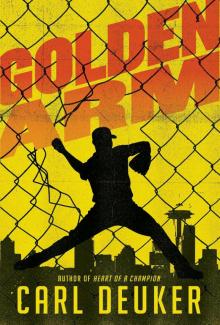 Golden Arm
Golden Arm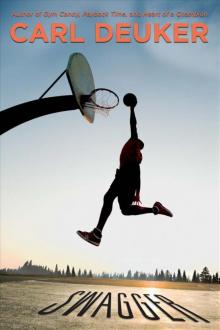 Swagger
Swagger Gym Candy
Gym Candy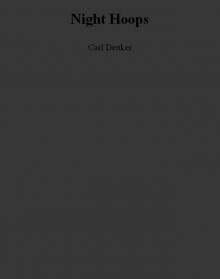 Night Hoops
Night Hoops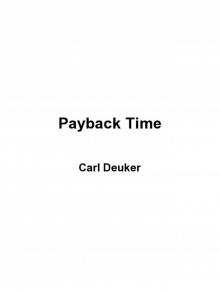 Payback Time
Payback Time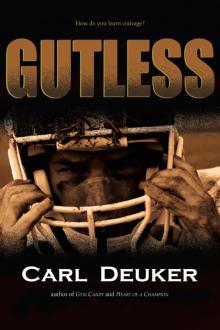 Gutless
Gutless Runner
Runner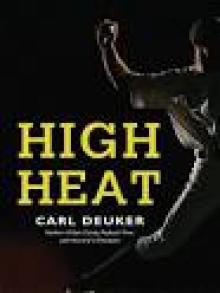 High Heat
High Heat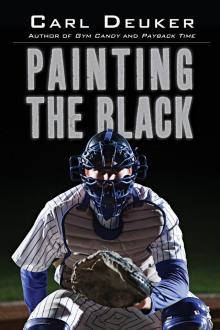 Painting the Black
Painting the Black